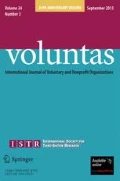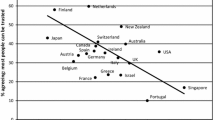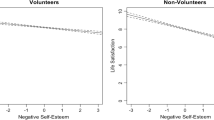Abstract
This paper empirically examines how and what facets of social capital relate to one’s subjective well-being in Japan by using data from the Japan General Survey 2010. It further scrutinises whether the relationship between well-being and volunteering changes throughout one’s life course. The result reveals that social capital overall positively correlates with subjective well-being. It further suggests that trust and volunteering have a positive relation to one’s subjective well-being, whereas membership did not. It also became apparent that volunteering is associated with one’s subjective well-being differently depending on one’s life stage measured by age category such that volunteers in their 1950s are less happy than volunteers in their 1960s. The results of analysis therefore suggest that the relationship between volunteering and well-being is not straightforward, and that this issue requires even further investigation.
Résumé
Cet article empirique étudie les aspects du capital social liés au bien-être subjectif de la population au Japon, et comment, en utilisant des données de l’enquête générale du Japon de 2010. Il examine également si le lien entre le bien-être et le bénévolat est modifié au cours de la vie. Les résultats révèlent qu’il existe en général une corrélation positive entre le capital social et le bien-être subjectif. Ils suggèrent, en outre, que la confiance et le bénévolat ont un lien positif avec le bien-être subjectif, alors que le fait d’être membre n’en a pas. Il ressort également que le volontariat est associé au bien-être subjectif différemment en fonction du stade de la vie mesurée par catégorie d’âge, si bien que les bénévoles âgés de la cinquantaine sont moins heureux que les bénévoles dans la soixantaine. Les résultats de l’analyse suggèrent donc que la relation entre le bénévolat et le bien-être n’est pas simple et que cette question nécessite d’autres recherches.
Zusammenfassung
In diesem Beitrag wird anhand von Daten aus der 2010 in Japan durchgeführten allgemeinen Bevölkerungsumfrage eine empirische Untersuchung vorgenommen, um zu sehen, wie und welche Facetten des sozialen Kapitals in Verbindung mit dem subjektiven Wohlbefinden von Menschen in Japan stehen. Darüber hinaus wird geprüft, ob sich die Beziehung zwischen dem Wohlbefinden und einer ehrenamtlichen Tätigkeit im Verlauf des Lebens ändert. Das Ergebnis zeigt, dass das soziale Kapital insgesamt in einer positiven Wechselbeziehung zum subjektiven Wohlbefinden steht. Es weist ferner darauf hin, dass Vertrauen und eine ehrenamtliche Tätigkeit in einem positiven Verhältnis zum subjektiven Wohlbefinden einer Person stehen, während eine Mitgliedschaft dies nicht tat. Es war zudem zu erkennen, dass sich eine ehrenamtliche Tätigkeit je nach Lebensabschnitt in Abhängigkeit vom Alter unterschiedlich auf das subjektive Wohlbefinden einer Person auswirkt, nämlich dass Ehrenamtliche, die um die fünfzig Jahre alt sind, nicht so glücklich sind wie Ehrenamtliche um die sechzig Jahre. Die Ergebnisse der Analyse lassen somit erkennen, dass es sich bei der Beziehung zwischen einer ehrenamtlichen Tätigkeit und dem Wohlbefinden einer Person nicht um eine direkte Beziehung handelt, sondern weitere Untersuchungen erforderlich sind.
Resumen
El presente documento examina empíricamente cómo y qué facetas del capital social se relacionan con el bienestar subjetivo de cada uno en Japón utilizando datos de la Encuesta General de Japón de 2010. Examina también si la relación entre el bienestar y el voluntariado cambia a lo largo de la vida de cada uno. El resultado revela que el capital social en general se correlaciona de manera positiva con el bienestar subjetivo. Sugiere asimismo que la confianza y el voluntariado tienen una relación positiva con el bienestar subjetivo de cada uno, mientras que la pertenencia como miembro no lo tenía. También resultó evidente que el voluntariado se asocia al bienestar subjetivo de cada uno de manera diferente dependiendo de la etapa vital de cada uno medida por categoría de edad, de forma que los voluntarios con 50 años son menos felices que los voluntarios con 60. Los resultados del análisis sugieren, por consiguiente, que la relación entre el voluntariado y el bienestar no es directa, y que esta cuestión requiere todavía investigaciones adicionales.
摘要
本文采用《2010年日本整体调查》的数据,实证地调查了,在日本,社会资本在哪些方面、是如何与一个人的主观幸福感相联系的。本文进一步细致探究了幸福感与志愿服务之间的关系在一个人的整个生命历程中是否有所改变。结果表明,社会资本与主观幸福感呈整体正相关性。本文还显示,信任、志愿服务与一个人的主观幸福感呈正相关关系,而会员(制)则不然。由个人的不同生命阶段(按年龄分类)所决定的志愿服务与个人的主观幸福感之间的相关性差异也变得显而易见,如此说来,年龄为50~60岁的志愿者不会比年龄为60~70岁的志愿者更快乐。因此,分析的结果显示志愿服务与幸福感之间的关系并非是明确的,这一问题需要更进一步的调查。
ملخص
يدرس هذا البحث تجريبيا˝ كيف وماذا من جوانب رأس المال الإجتماعي ذات الصلة بالرفاهية الشخصية للمرء في اليابان بإستخدام بيانات من إستطلاع رأي عام في اليابان عام 2010. تدقق أبعد من ذلك إذا كانت العلاقة بين الرفاعية والعمل التطوعي تتغير خلال دورة حياة الشخص. النتيجة تكشف عن أن رأس المال الإجتماعي يرتبط عموما˝ بشكل إيجابي مع الرفاهية الذاتية. علاوة على ذلك تقترح أن الثقة والتطوع لديهما علاقة إيجابية على الرفاهية الشخصية للمرء ، في حين أن العضوية ليس لها علاقة. كما أصبح من الواضح أن العمل التطوعي يرتبط بالرفاهية الشخصية للمرء بشكل مختلف إعتمادا˝ على مرحلة حياة المرء تقاس حسب الفئة العمرية بحيث المتطوعين في عمر الخمسينات (50) هم أقل سعادة من المتطوعين في عمر الستينات(60). بالتالي تشير نتائج التحليل إلى أن العلاقة بين العمل التطوعي والرفاهية ليست واضحة، وأن هذه المسألة تتطلب حتى مزيد من التحقيقات.

Similar content being viewed by others
Notes
Membership in volunteer organisations is often used as one of the membership variables. Yet, an actual volunteering is less used in the context of social capital.
References
Becchetti, L., Ricca, E.G., & Pelloni, A. (2009) The 60 s turnaround as attest on causal relationship between sociability and happiness, SOEP Papers on Multidisciplinary Panel Data Research, No. 209. Berlin.
Bjørnskov, C. (2003). The happy few: Cross-country evidence on social capital and life satisfaction. Kyklos, 56(1), 3–16.
Bjørnskov, C. (2008). Social capital and happiness in the United States. Applied Research Quality Life, 3(1), 43–62.
Blanchflower, D. G., & Oswald, A. J. (2004a). Well-being over time in Britain and the USA. Journal of Public Economics, 88, 1359–1386.
Blanchflower, D. G., & Oswald, A. J. (2004b). Money, sex and happiness: An empirical study. Scandavian Journal of Economics, 106(3), 393–415.
Blanchflower, D. G., & Oswald, A. J. (2005). Happiness and the human development index: the paradox of Australia. The Australian Economic Review, 38(3), 307–318.
Brehm, J., & Wendy, R. (1997). Individual level evidence for the causes and consequences of social capital. American Journal of Political Science, 41(July), 888–1023.
Brown, E., & Ferris, J. M. (2007). Social capital and philanthropy: An analysis of the impact of social capital on individual giving and volunteering. Nonprofit and Voluntary Sector Quarterly, 36(1), 85–99.
Cabinet Office (2012) The public opinion poll on gender-equal society. http://www8.cao.go.jp/survey/h24/h24-danjo/2-2.html. Accessed 7 June 2013.
Calvo, R., Yuhui, Z., Kumar, S., Olgati, A., Berkman, L., & Mock, N. (2012). Well-being and social capital on planet earth: Cross-national evidence from 142 countries. PLoS ONE, 7(8), 1–10. special section.
Cramm, J. M., Moller, V., & Nieboer, A. P. (2012). Individual and neighbourhoods-level indicators of subjective well-being in a small and poor eastern cape township: The effects of health, social capital, marital status and income. Social Indicators Research, 105, 581–593.
Deaton, A. (2008). Income, health, and well-being around the world: Evidence from the gallup world poll. Journal of Economic Perspectives, 22(2), 53–72.
Di Tella, R., MacCulloch, R., & Oswald, A. (2001). Preferences over inflation and unemployment. Evidence from surveys of happiness. The American Economic Review, 91(1), 335–341.
Diekmann, A. (2004). The power of reciprocity. Fairness, reciprocity and stakes in variants of the dictators game. Journal of Conflict Resolution, 48, 487–505.
Diener, Ed, & Biswas-Diener, R. (2002). Will money increase subjective well-being? Social Indicators Research, 57, 119–169.
Diener, Ed., Kahneman, D., and Helliwell, J. (2010) International Differences in Well-Being. New York: Oxford University Press.
Durlauf, S. N. (2002). On the empirics of social capital. The Economic Journal, 112(483), 459–479.
Easterlin, R. (1974). Does economic growth improve the human lot? Some empirical evidence. In P. A. David & M. W. Reder (Eds.), Nations and households in economic growth: Essays in honor of Moses Abramovitz (pp. 89–125). New York: Academic Press, Inc.
Easterlin, R. (2003). Explaining happiness. Proceedings of the National Academy of Science., 100(19), 1176–1183.
Easterlin, R. (2006). Life cycle happiness and its sources. Intersections of psychology, economics and demography. Journal of Economic Psychology, 27, 463–482.
Fahey, T., & Smyth, E. (2004). Do subjective indicators measure welfare? Evidence from 33 European societies. European Societies, 6(1), 5–27.
Ferrer-i-Carbonell, A. (2005). Income and well-being: An empirical analysis of the comparison income effect. Journal of Public Economics, 89, 997–1019.
Frey, B. S., & Stutzer, A. (2000). Happiness. Economy and Institutions, Economic Journal, 110(466), 918–938.
Frey, B. S., & Stutzer, A. (2002). Happiness and economics: How the economy and institutions affect human well-being. Princeton, NJ: Princeton University Press.
Gilbert, D. (2006). Stumbling on happiness. London: Harper Perennial.
Haller, M., & Hadler, M. (2006). How social relations and structures can produce happiness and unhappiness: An international comparative analysis. Social Indicators Research, 75, 169–216.
Hansen, T. (2012). Parenthood and happiness: a review of folk theories versus empirical evidence. Social Indicators Research, 108(1), 29–64.
Helliwell, J. F. (2003). How’s life? Combining individual and national variables to explain subjective well-being. Economic Modelling, 20, 331–360.
Helliwell, J. F., & Barrington-Leigh, C. F. (2010). How Much is Social Capital Worth? NBER Working Papers 16025, National Bureau of Economic Research, Inc.
Helliwell, J. F., & Wang, S. (2011). Trust and wellbeing. International Journal of Wellbeing, 1(1), 42–78.
Huang, H., & Humphreys, B. R. (2012). Sports participation and happiness: Evidence from US microdata. Journal of Economic Psychology, 33(4), 776–793.
Kinder, R., & Kiewit, D. (1979). economic discontent and political behavior: The role of personal grievances and collective economic judgments in congressional voting. American Journal of Political Science, 23, 495–527.
Konow, J., & Earley, J. (2008). The hedonistic paradox: Is homo economicus happier? Journal of Public Economics, 92(1–2), 1–33.
Kroll, C. (2011). Different things make different people happy: Examining social capital and subjective well-being by gender and parental status. Social Indicators Research, 104(1), 157–177.
Kuroki, M. (2011). Does social capital increase individual happiness in Japan? Japanese Economic Review., 62(4), 444–459.
Luttmer, E. F. P. (2005). Neighbors as negatives: Relative earnings and well-being. The Quarterly Journal of Economics, 20(3), 963–1002.
MacCulloch, R., & Di Tella, R. (2005). Partisan social happiness. Review of Economic Studies, 72, 367–393.
Meier, S., & Stutzer, A. (2008). Is volunteering rewarding in itself? Economica, 75, 39–59.
Menchik, P. L., & Weisbrod, B. A. (1987). Volunteer labor supply. Journal of Public Economics, 32, 159–183.
Pichler, F. (2006). Subjective quality of life of young Europeans. Feeling happy but who knows why? Social Indicators Research, 75, 419–444.
Portes, A. (1998). Social capital: Its origins and applications in modern sociology. Annual Review of Sociology, 24, 1–24.
Putnam, R. (1995). Bowling alone: America’s declining social capital. Journal of Democracy, 6(1), 65–78.
Putnam, R. (2000). Bowling alone: the collapse and revival of American community. New York: Simon and Schuster.
Ram, R. (2010). Social capital and happiness: Additional cross-country evidence. Journal of Happiness Studies, 11(4), 409–418.
Sarracino, F. (2010). Social capital and subjective well-being trends: Comparing 11 western European countries. The Journal of Socio-Economics, 39(4), 482–517.
Shields, M., & Wheatley Price, S. (2005) Exploring the economic and social determinants of psychological well-being and perceived social support in England. Journal of Royal Statistical Society (Part 3), 513–537.
Smith, K. (2003). Individual welfare in the Soviet Union. Social Indicators Research, 64, 75–105.
Stutzer, A. (2004). The role of income aspirations in individual happiness. Journal of Economic Behaviour and Organisation, 54, 89–109.
Tsutui, Y., Ohtake, F., & Ikeda, S. (2005). Why are you unhappy? (Anata wa Naze Fuko Nanoka.) Osaka University. Journal of Economics, 58(4), 20–57.
Uslaner, E. M. (2002). The moral foundations of trust. New York: Cambridge University Press.
Van Willgen, M. (2000). Differential benefits of volunteering across the life course. The Journal of Gerontology Series B: Psychological Sciences and Social Sciences, 55B, S308–S318.
Verbrugge, L. M., Reoma, J. M., & Gruber-Baldini, A. L. (1994). Short-term dynamics of disability and well-being. Journal of Health and Social Behavior, 35, 97–117.
Wheeler, A., Gorey, M., & Bernard, G. (1998). The beneficial effects of volunteering for older volunteers and the people they serve: a meta-analysis. International Journal of Aging and Human Development, 47(1), 69–79.
Wills-Herrera, E., Orozco, L. E., Forero-Pineda, C., Pardo, O., & Andonova, V. (2011). The relationship between perceptions of insecurity, social capital and subjective well-being: Empirical evidences from areas of rural conflict in Colombia. The Journal of Socio-Economics, 40, 88–96.
Winkelmann, R. (2009). Unemployment, social capital, and subjective well-being. Journal of Happiness Studies, 10(4), 421–430.
Wollebaek, D., & Selle, P. (2002). Does participation in voluntary associations contribute to social capital? The impact of intensity, scope, and type. Nonprofit and Voluntary Sector Quarterly, 31(1), 32–61.
Yip, W., Subramanian, S. V., Mitchell, A. D., Lee, D. T. S., Wang, J., et al. (2007). Does social capital enhance health and well-being? Evidence from rural China. Social Science and Medicine, 64, 35–49.
Author information
Authors and Affiliations
Corresponding author
Rights and permissions
About this article
Cite this article
Matsushima, M., Matsunaga, Y. Social Capital and Subjective Well-Being in Japan. Voluntas 26, 1016–1045 (2015). https://doi.org/10.1007/s11266-015-9581-3
Published:
Issue Date:
DOI: https://doi.org/10.1007/s11266-015-9581-3




